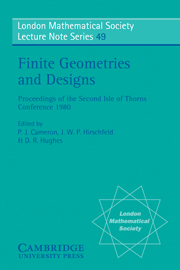Book contents
- Frontmatter
- Contents
- PREFACE
- Introduction
- Generalized Steiner systems of type 3-(v, {4,6}, 1)
- Some remarks on D.R. Hughes' construction of M12 and its associated designs
- On k-sets of class [0,1,2,n]2 in PG(r,q)
- Covering graphs and symmetric designs
- Arcs and blocking sets
- Flat embeddings of near 2n-gons
- Codes, caps and linear spaces
- Geometries originating from certain distance-regular graphs
- Transitive automorphism groups of finite quasifields
- On k-sets of type (m,n) in projective planes of square order
- On k-sets of type (m,n) in a Steiner system S(2, l, v)
- Some translation planes of order 81
- A new partial geometry constructed from the Hoffman-Singleton graph
- Locally cotriangular graphs
- Coding theory of designs
- On shears in fixed-point-free affine groups
- On (k,n)-arcs and the falsity of the Lunelli-Sce conjecture
- Cubic surfaces whose points all lie on their 27 lines
- Existence results for translation nets
- Translation planes having PSL(2,w) or SL(3,w) as a collineation group
- Sequenceable groups: a survey
- Polar spaces embedded in a projective space
- On relations among the projective geometry codes
- Partition loops and affine geometries
- Regular cliques in graphs and special 1½ designs
- Bericht über Hecke Algebren und Coxeter Algebren eindlicher Geometrien
- On buildings and locally finite Tits geometries
- Moufang conditions for finite generalized quadrangles
- Embedding geometric lattices in a projective space
- Coverings of certain finite geometries
- On class-regular projective Hjelmslev planes
- On multiplicity-free permutation representations
- On a characterization of the Grassmann manifold representing the lines in a projective space
- Affine subplanes of projective planes
- Point stable designs
- Other talks
- Participants
Existence results for translation nets
Published online by Cambridge University Press: 05 April 2013
- Frontmatter
- Contents
- PREFACE
- Introduction
- Generalized Steiner systems of type 3-(v, {4,6}, 1)
- Some remarks on D.R. Hughes' construction of M12 and its associated designs
- On k-sets of class [0,1,2,n]2 in PG(r,q)
- Covering graphs and symmetric designs
- Arcs and blocking sets
- Flat embeddings of near 2n-gons
- Codes, caps and linear spaces
- Geometries originating from certain distance-regular graphs
- Transitive automorphism groups of finite quasifields
- On k-sets of type (m,n) in projective planes of square order
- On k-sets of type (m,n) in a Steiner system S(2, l, v)
- Some translation planes of order 81
- A new partial geometry constructed from the Hoffman-Singleton graph
- Locally cotriangular graphs
- Coding theory of designs
- On shears in fixed-point-free affine groups
- On (k,n)-arcs and the falsity of the Lunelli-Sce conjecture
- Cubic surfaces whose points all lie on their 27 lines
- Existence results for translation nets
- Translation planes having PSL(2,w) or SL(3,w) as a collineation group
- Sequenceable groups: a survey
- Polar spaces embedded in a projective space
- On relations among the projective geometry codes
- Partition loops and affine geometries
- Regular cliques in graphs and special 1½ designs
- Bericht über Hecke Algebren und Coxeter Algebren eindlicher Geometrien
- On buildings and locally finite Tits geometries
- Moufang conditions for finite generalized quadrangles
- Embedding geometric lattices in a projective space
- Coverings of certain finite geometries
- On class-regular projective Hjelmslev planes
- On multiplicity-free permutation representations
- On a characterization of the Grassmann manifold representing the lines in a projective space
- Affine subplanes of projective planes
- Point stable designs
- Other talks
- Participants
Summary
We consider (s, r; μ)-nets admitting a group G of auto-morphisms acting regularly on the point set and fixing each parallel class; such nets will be called translation nets (due to Sprague for μ = 1). Our main interest is in deriving bounds on the maximum possible value of r (given s and μ) subject to certain restrictions on G (e.g. for abelian groups). Translation nets are equivalent to a generalization of the congruence partitions defined by André. We prove a decomposition theorem in the case of nilpotent groups and show that here the problem may be reduced to finding the maximum value of r for (pi, r; pj)-translation nets with elementary abelian translation group; this is related to partial t-spreads. Using a result of Schulz, we show that every translation affine design has the parameters of an affine space or desarguesian affine plane and has an elementary abelian translation group. A similar result holds for symmetric translation nets with a nilpotent translation group.
INTRODUCTION AND PRELIMINARY KNOWLEDGE
In this paper we consider a generalization of the well-known nets of Bruck [4], [5] where non-parallel blocks intersect μ times (μ not necessarily equal to 1); we are interested in such structures admitting a translation group G (i.e. G acts regularly on the point set and fixes each parallel class).
- Type
- Chapter
- Information
- Finite Geometries and DesignsProceedings of the Second Isle of Thorns Conference 1980, pp. 172 - 196Publisher: Cambridge University PressPrint publication year: 1981
- 12
- Cited by



